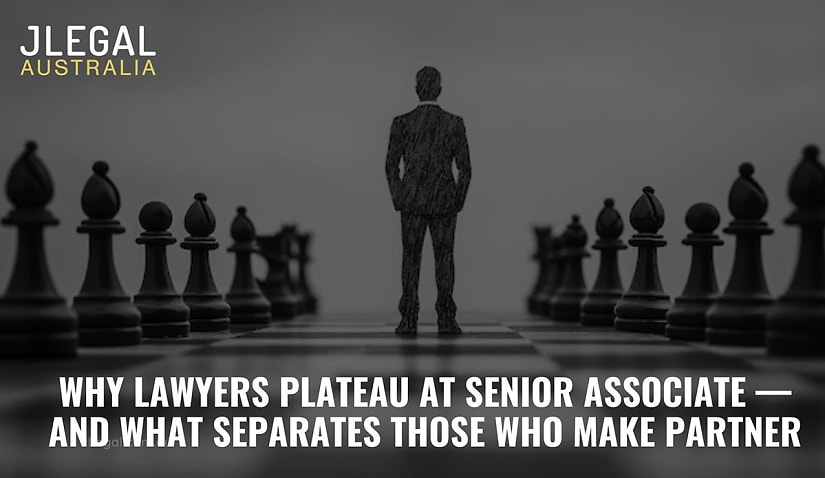Why Lawyers Plateau at Senior Associate — And What Separates Those Who Make Partner
Across Australia’s law firms, the transition from senior associate to partner is one of the most significant, and misunderstood, career inflection points in the legal profession. Every firm has talented, capable senior lawyers who produce exceptional work, cultivate strong client relationships, and contribute meaningfully to their practice teams. Yet only a fraction progress to partnership.

From my experience as a former lawyer, long-time legal recruiter, and now executive coach to lawyers and leaders, the pattern is unmistakable: lawyers do not plateau due to a deficiency in technical skill. They plateau because they fail to make the behavioural and leadership shifts the partnership model quietly demands.
Partnership is not a reward for longevity, competence, or commitment. It is a fundamentally different role, one that requires a fundamentally different way of thinking, working, and showing up.
This article examines the underlying reasons many senior lawyers stall in their progression and highlights the distinct qualities that mark a future partner.
Partnership Is a Leadership Role — Not a Technical Promotion
By the time a lawyer reaches senior associate level, technical proficiency is assumed. The differentiator becomes something far more nuanced: leadership readiness.
Partnership requires the ability to:
-
inspire confidence in clients,
-
lead teams through complexity,
-
provide commercial clarity,
-
and influence without relying solely on hierarchy.
This means firms are not promoting “the best lawyer.” They are promoting the person who demonstrates the capacity to steer a practice — and the people within it — into the future.
The mistake many senior associates make is continuing to rely on technical excellence as their primary value signal. It is necessary, but no longer sufficient.
The Identity Shift: From Practitioner to Business Builder
One of the deepest shifts, and the one least explicitly discussed in many firms, is the transition from high-performing practitioner to strategic business contributor.
Senior lawyers who plateau often remain focused on:
-
personal billings,
-
matter management,
-
short-term delivery,
-
and technical precision.
Future partners, however, display an entirely different orientation. They think about:
-
the sustainability of the practice,
-
the economics of the firm,
-
client retention and growth,
-
cross-practice collaboration,
-
market positioning,
-
and strategic decision-making.
These individuals demonstrate not only legal expertise but commercial awareness and forward-thinking judgment, qualities that signal partnership potential long before they have a book of business.
Influence and Visibility: The Intangible Currency of Promotion
In every promotion round I have observed over the past 25 years, visibility plays a decisive role, often more than lawyers realise.
Partnership decisions are made in closed rooms by people who must advocate for a candidate with conviction. To do so, they need both knowledge of the person and confidence in their capabilities.
This requires:
-
consistent exposure to senior stakeholders,
-
contribution to firm-wide initiatives,
-
participation in pitches or strategic projects,
-
and a presence that extends beyond immediate working groups.
High performance behind closed doors is admirable. But influence requires being known, being trusted, and being seen contributing beyond one’s own desk.
Visibility is not self-promotion.
It is evidence of readiness to operate at partnership level.
The Rise of Emotional Intelligence as a Core Competency
As legal work becomes more complex and client expectations continue to evolve, emotional intelligence has emerged as a critical differentiator. Firms increasingly promote individuals who can manage pressure with composure, communicate with clarity, and cultivate strong relational trust.
EQ shows up in the ability to:
-
handle conflict constructively,
-
guide teams through demanding periods,
-
respond thoughtfully rather than reactively,
-
and navigate diverse personalities and perspectives.
In many partnership processes, these qualities carry equal, if not greater, weight than technical ability. They are essential for safeguarding client relationships, strengthening team cohesion, and sustaining long-term practice growth.
The Plateau Effect: When Strengths Become Limitations
Interestingly, the behaviours that propel a lawyer to senior associate can become the very behaviours that hold them there.
For example:
-
being the “safe pair of hands”
-
being the go-to technician
-
taking on the heaviest workload
-
prioritising perfection over progress
-
managing rather than delegating
-
solving rather than elevating
These habits signal reliability, but not strategic leadership.
Partnership requires the ability to step back from the work, empower others, and focus on the broader ecosystem. Many lawyers remain tightly tethered to the mindset that made them successful earlier in their career, not realising the role has changed.
The Differentiator Among Those Who Rise
Among the countless senior lawyers I have worked with, the ones who ascend to partnership demonstrate one consistent trait:
They take ownership of their development.
They don’t wait for the firm to tap them on the shoulder.
They don’t assume time served will translate into promotion.
They don’t rely solely on billables or technical mastery.
Instead, they:
-
seek feedback early and often,
-
invest in coaching or mentoring,
-
cultivate cross-firm relationships,
-
develop their presence and communication skills,
-
and actively work on the behavioural shifts required for leadership.
These lawyers understand that partnership is not an endpoint — it is a transition into a new professional identity.
Conclusion: The Real Barrier to Partnership Isn’t Skill — It’s Mindset
The plateau at senior associate level is rarely about capability. It is about alignment: aligning behaviours with the demands of a leadership role, aligning presence with influence, and aligning mindset with the responsibilities of partnership.
For lawyers ready to move beyond plateau and into intentional progression, the work is both internal and strategic. With the right guidance, these shifts are not only achievable — they can be transformative.
If you are a senior associate or special counsel preparing for partnership or seeking clarity about your next step, I support lawyers in building the leadership, commercial, and behavioural capabilities firms look for.
To explore how coaching can help you refine your pathway, you can reach me at
© JLegal Australia 2025
